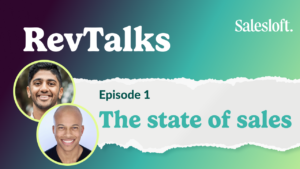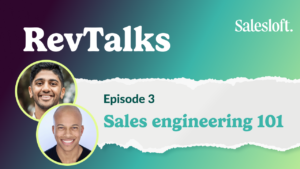If revenue pros are thinking it, we’re saying it. Join us live as go-to-market experts share their best advice and insights from the frontlines of revenue — with tactics you can immediately implement at your organization.
In the second episode of RevTalks, sales engineering experts Chris Turner and Rebby John go over what it takes to get deals to close in today’s market (hint: it’s much more than a personal connection). See what they have to say about influencing deals, top pre-sales skills, navigating a complex deal structure, and more.
This interview has been edited for clarity and length.
Influencing a deal
Rebby:
Would you say that understanding a customer’s business and a strong personal connection are more influential to closing the deal than meeting and validating technical requirements?
Chris:
I’m going to give everyone’s favorite generic answer: it depends. In this environment, probably not. I don’t think it’s enough for us to have a strong personal connection, or for us to have a deep understanding of our client’s business. I think that’s a necessity for us to be able to get things across the line.
At the end of the day, if it just took a good connection, then we really wouldn’t be that great of a partner. We wouldn’t be solving their business problems. I can’t tell you how many friends I have in the industry who are great connections, but I probably wouldn’t buy their platform because it doesn’t solve an inherent need of my business or my team.
There’s never a world in which great personal connections aren’t great in sales. But we have to think more broadly when we’re actually trying to solve problems for our customers.
Account team success
Rebby:
What do you think it looks like for an account team to satisfy both of those things? To build a really strong personal connection, but then to also meet and validate technical requirements?
Chris:
There’s probably three major components to that.
- Mirroring the internal buying committee with our internal team.
So, for example, um, if a VP-level or C-suite is involved in the deal, we’re pulling in our corresponding VP or CRO. And we should probably be doing that earlier in the deal cycle.
A bad habit that I think a lot of sellers have had, and I’m honestly guilty of this, is waiting until we get into the contract negotiation stage. And then pulling in the VP or CRO. Even if it doesn’t feel like it tangibly moves the deal in that moment, that relationship will pay dividends later — especially when you start to get into legal and contract negotiations.
- A strong connection only gets us part of the way.
We need to pull up things like customer success, technical discovery, and alignment, too. The more that we can present ourselves as a partner — not just a technical solution — that’s how a relationship starts to manifest itself across the entire buying committee.
- Customer success
We’ve done a ton of work in our business internally to make sure that we’re positioned to make our customers successful. Customer success is everybody’s job. But I think sales is also everybody’s job. So the way that we can inspire confidence with our customers is by actively involving our post-sale team with the customer and pulling them into those conversations as well.
Top pre-sales skills
Chris:
What are the key skill sets of a top performing pre sales professional in today’s market?
Rebby:
The first key trait is ownership. Just ultimate ownership of getting the customer to a point where they want to purchase your software. That means:
- Working with all different kinds of personalities
- Not letting anything be a blocker, internally or externally
- Always bringing a solution to the table
- Moving forward in the deal cycle
Believing you are a co-seller and equal partner in the deal cycle is what will result in an effective proof of concept, resulting in a well built relationship with the technical champion.
Second, in our profession, we’re uniquely positioned to have a level of trust and credibility just by the nature of the role that we play in a deal cycle. So it’s important for us to live up to that credibility and deliver a strong perspective to our buyer as to how we can dramatically improve their business. That credibility is broken if you don’t know the industry, the product that you’re selling, or the customer really well.
And then finally, a sales engineer or pre-sales professional has to create the common thread of value, then the use cases and the value it drives as it relates to the work they deliver. Whether it’s a demonstration or a proof of concept or any kind of technical workshop, the value of the tool must always be front and center.
So I think if you, if you have those three things,
- Ownership
- A strong perspective on the industry/customer’s needs
- Focus on value
Chris:
One more word that I would add is curiosity. Yes, it’s important for us to be credible. But I’ve noticed that it’s easy to pretend like you know everything. Ironically, that actually is off-putting to most people. The way to overcome that is by asking questions. Asking deep, open ended questions that put customers at ease, but also put us in the shoes of the customer so that we can better align to value.
Navigating a complex deal structure
Rebby:
Share an example of a time you had to navigate a really complex deal structure, buying committee, or set of technical requirements. How did you strategically influence each stakeholder in that deal cycle to get the deal done?
Chris:
This was an existing customer where one company was merging into five different companies, They all used different sales engagement. It swiftly became a competitive deal. Itt also meant that the buying committee had ballooned to 20 people.
We really had to map out the account and get a good understanding of what was important to each business leader in that conversation. Oh, by the way, to make things more complex, we only had a one-hour conversation to prove that we were the vendor.
Rebby:
As you often do in RFP style evaluations.
Chris:
Yep! So as you can imagine, everyone has their opinion. Everyone’s opinion is right. So for us, it was really important to understand deeply and leverage the time that we had. We had about a week of prep to make sure that we understood everyone within that buying process — what their priorities were — so we could create a compelling story.
So there are a few actionable things that we did. The seller who was leading the account had a very strong relationship with a champion internally. Our champion was able to give us access to the political influencers within that organization whose opinions were very strong, and also was able to give us access to some of the top performing end users so that we could tell a more compelling story about what the workflow would look like.
We were able to get strong technical alignment and have those conversations earlier so that when we got into that one hour conversation, it was purely to be focused on business outcomes.
We also up-leveled a conversation to their long-term business strategy. And because of our access with our champion, we were able to understand what their President of Sales was focused on, what their CRO was focused on, and inevitably what their CEO was focused on.
Then finally we aligned to the OKRs that were most important to the business, so that everything called back to an outcome that was important to the people who would inevitably make that decision.
Rebby:
My biggest takeaway in any RFP-led evaluation or complex buying committee is to have a champion on the inside feeding you information.
So much truly comes down to champions you can trust and your sense of ownership. Use those resources to meet your customers where they are, solve their problems, and understand their goals on a fundamental level. The committee and structures might be getting more complex, but your approach to meeting and validating your customers’ requirements doesn’t.
Check out the rest of the series
If you enjoyed this article, read part one about the shifting sales landscape or part three to learn their takes on the sales engineering profession. Then subscribe to our YouTube channel to get notified whenever we drop fresh sales engineering videos.
 |
 |


